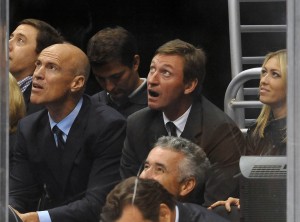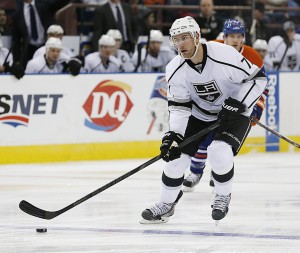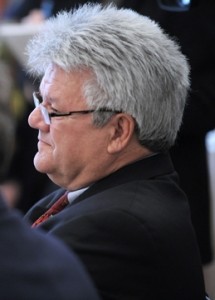
This statement won’t carry much shock value, but the Los Angeles Kings have made a lot of bad trades over their 46+ year history. It bears repeating: a lot of bad trades. Small wonder why the club had a losing record in 26 of their first 41 seasons, either missing the playoffs or losing in the first round in all but nine of those years.
The acquisition of Brian Englom and Ken Houston for Larry Murphy on October 18, 1983, for example, might just rank amongst the worst trades in NHL history. Engblom spent less than three full seasons in L.A. and was out of the NHL two years later. Houston appeared in just 33 games for the Kings before calling it a career. Meanwhile, all Murphy did was play for eighteen more years, skate in three All Star games, win four Stanley Cups, and find himself elected to the Hall of Fame in 2004. Ouch.
Trading away Butch Goring in 1980 for Billy Harris and Dave Lewis wasn’t much better. Giving up second and third round draft picks for Dan Cloutier was a disaster. More recently, Jeff Halpern for Teddy Purcell and a third round pick haunts them every time Tampa Bay appears on the schedule.
Of course, fans of every team can point to bad trades their team made. Besides, this piece is about good deals, not bad ones. For all their mistakes, the Kings have had a number of (pardon the mixed metaphor here) home runs over their nearly half-century history.
Thus, without further ado, we present the top five Los Angeles Kings trades of all time.
Trade #5: Justin Williams for Patrick O’Sullivan and a 2009 2nd round pick
Admittedly, this was a tough one for me, as there was plenty of competition for this slot. In the end, though, it came down to equity and leadership.
With respect to equity, L.A. obtained a top-six right winger that has remained so since joining the Kings by selling the skilled-yet-flawed O’Sullivan at nearly the peak of his value to the Carolina Hurricanes. Williams hasn’t reached 30 goals like he did twice with the Hurricanes, but he has scored 22 twice and is likely to surpass 20 again this year. Meanwhile, O’Sullivan flopped after the trade and now toils in Europe. The second-round selection (Brian Dumoulin) plays for Wilkes-Barre in the AHL.
As for leadership, Williams plays ‘big’ when the game is one the line, and when the stakes are at their highest. He recorded 15 points during the Kings’ Cup run in 2012, and was second on the team in game-winning goals last year. It’s no coincidence that Los Angeles started winning the season after he was acquired, and hasn’t stopped since.
Trade #4: Jeff Carter for Jack Johnson and a conditional first round pick

As a Kings fan, I thought the much-heralded Johnson was overrated offensively and a near-disaster on defense. Despite reaching double-digit goals in 2011-12, my opinion hasn’t changed all that much.
He’s got a nice shot — when it reaches the net — but with just four goals in 66 games, he’s clearly not getting it done offensively for the Columbus Blue Jackets. Meanwhile, he’s a -5 so far this year, which indicates that the ‘olé!’ defense he played while with the Kings may have slightly improved. However, he’s never going to remind anyone of Ryan Suter. Or for that matter, Darryl Sutter. As for the conditional first, Marko Dano currently plays in the KHL.
Like the Williams deal, the Kings obtained a top-line caliber forward in 2012 for lesser returns who ultimately played a big part of their Cup-winning team down the stretch and in the playoffs. Carter scored 26 goals in 48 games last year to lead the team, and one again leads the club with 24 so far this season.
Trade #3: Ziggy Palffy and Brian Smolinski for Olli Jokinen, Mathieu Biron, Josh Green and a first round pick
There was a little more to this very big trade with the Islanders in 1999, but those were the key components. The Kings obtained a huge piece of their late 90s/early 2000s offense in this deal, one that helped them make the playoffs three straight years after missing them in five of the preceding six campaigns.
Palffy was a pure shooter, a dead-eye sniper who averaged 30 goals a season over his five years in L.A. He was productive despite missing significant time each year due to an array of injuries. Bryan Smolinski, the other key component of the deal for the Kings, was a reliable second-line center during his tenure in Los Angeles, scoring 20 or more goals twice.
It should be noted that Olli Jokinen eventually became a top-caliber center for the Florida Panthers. However, given that Palffy and Smolinski propelled the new millennium Kings to new heights, it belongs in the ‘win’ column.

Trade #2: Marcel Dionne and Bart Crashley for Terry Harper, Dan Maloney and a second round pick
This deal was a veritable heist. Sure, Harper had some gas in the tank and played five seasons in Detroit, and Maloney was a reliable left winger. Still, we’re talking about the Kings’ all time leading scorer here, a man who scored 550 goals and 1307 points in 921 games. How can this not be considered anything but highway robbery?
Dionne anchored the vaunted Triple Crown Line for six seasons, registering over 100 points in all but one of those years. As we all know, he’s got a shiny placard in the Hall of Fame for his efforts.
Detroit just got the shaft. The Red Menace has been exacting revenge on the Kings ever since.
Trade #1: Wayne Gretzky, Marty McSorley and Mike Krushelnyski for Jimmy Carson, Martin Gelinas and three first round picks
Big surprise, right? The stunning, ground-breaking trade between the Los Angeles Kings and Edmonton Oilers in 1988 shocked everyone in both the U.S. and Canada above the age of three. Well, maybe just Canada, but it was pretty big news in America as well. With one fell swoop, hockey became relevant in Los Angeles, and quite a bit less relevant in Edmonton. Even today, you can almost hear the echoes of the shock waves it created.
Jimmy Carson had one great year left in him (49 goals) but dropped off after that. Gelinas was a reliable forward and Rucinsky bounced around for a long time in the NHL. The rest of the returns didn’t amount to much for the Oilers. Meanwhile, Gretzky continued to rack up points during his time in Los Angeles, and both McSorley and his stick gained notoriety. It also led directly to the Kings’ first Cup appearance in 1993.
All in all, considering the effect it had on both the Kings and the NHL, The Trade has to be considered the best deal ever made in Los Angeles Kings history.
What do you think? Do you feel any of these don’t belong on the list, and if so, what are others you’d prefer to see on here?
How is the Rogie Vachon deal not on here?